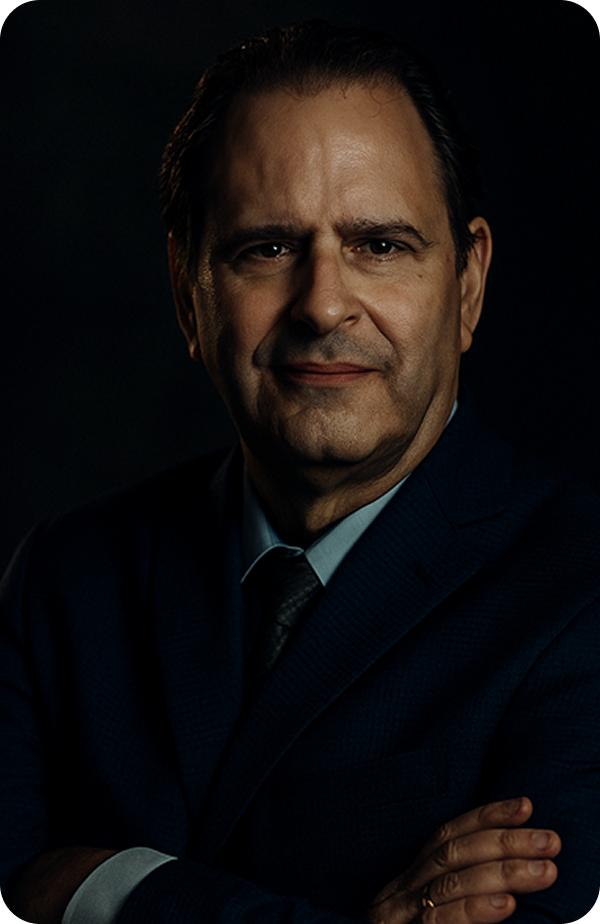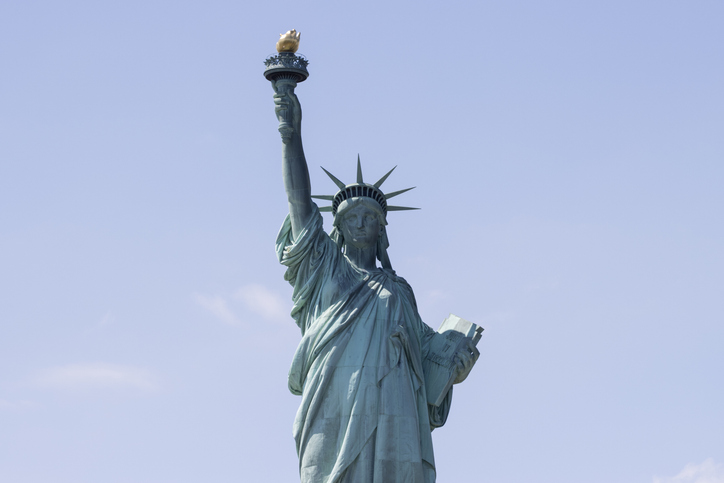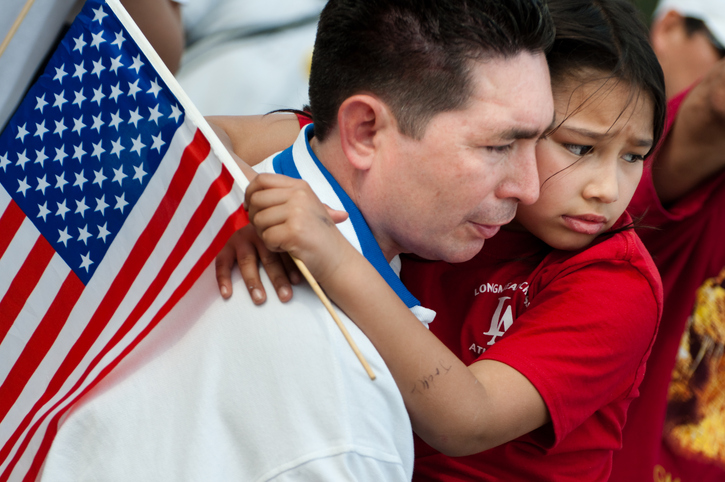By Richard T. Herman — Immigration Attorney, 30+ Years of Experience
The journey to U.S. citizenship has never felt more important — or more intimidating. Under the Trump–Vance administration, USCIS has reinstated the expanded 128-question civics test, reshaped interview procedures, and increased scrutiny during naturalization.
For many immigrants, this test is not just a list of questions. It is a gateway to safety, stability, family unity, and a future they have worked decades to build.
QUICK ANSWER
- The new 128-question civics test applies to anyone filing Form N-400 on or after Oct. 20, 2025.
- You will be asked 20 questions, and must answer 12 correctly to pass.
- It is an oral test administered during the naturalization interview.
- Exemptions exist for applicants 50/20, 55/15, or 65/20, and for certain disabilities (N-648).
- Ohio applicants test at Cleveland, Columbus, or Cincinnati USCIS Field Offices (addresses included below).
- Full list of 128 official questions and answers is included in Part II of this article.
- Official USCIS civics test page (verified):
https://www.uscis.gov/citizenship/find-study-materials-and-resources/study-for-the-test
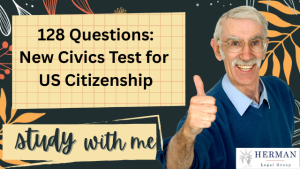
FAST FACTS — 2026 Edition
- Total questions: 128
- Questions asked: 20
- Number needed to pass: 12
- Format: Oral (no multiple choice)
- Second attempt: Yes — within 60–90 days
- Applies to applications filed after: October 20, 2025
- English test still required (unless exempt)
- Trump-era policy: Stricter civics and English evaluation
- Exemptions: 50/20, 55/15, 65/20, N-648 disability waiver
- Field offices for Ohio applicants: Cleveland, Columbus, Cincinnati
Why USCIS Reinstated the 128-Question Test in 2026
The Trump administration argued that the expanded test:
- Improves “civic literacy”
- Reduces “rote memorization”
- Aligns with education standards
- Ensures naturalized citizens understand “core American values”
But immigration experts widely acknowledge the true political context:
1. Higher Barriers to Citizenship
An expanded question pool and stricter evaluation naturally raise the difficulty level — especially for older immigrants, those with limited English, and low-income applicants.
2. Increased Scrutiny of Applicants
Attorneys nationwide report more intensive questioning on:
- Voting history
- Taxes
- Criminal issues
- Public benefits
- Long absences
- Employment inconsistencies
- Political associations
3. The Broader Trump 2.0 Immigration Strategy
The return of the 128-question test fits into a larger enforcement agenda:
- Tightened naturalization reviews
- Increased denials based on “good moral character”
- More N-400 investigations
- Expanded ICE–USCIS collaboration
“For many immigrants, the civics test is not just an exam — it is a test of their dreams.”
— Attorney Richard T. Herman
Under today’s political climate, immigrants feel:
- Fear of failing
- Anxiety about English
- Pressure to support their families
- Frustration with changing rules
- Stress about interacting with federal officers
This guide is designed to reduce that fear, increase clarity, and give applicants confidence.
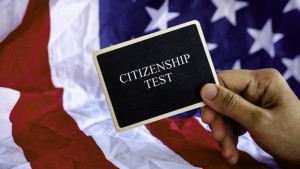
Who Must Take the New 128-Question Test (2026 Rules)
✔ You must take the new test if:
- You file Form N-400 on or after Oct. 20, 2025
- You are 18–54 years old
- You do not qualify for a language exemption
- You do not qualify for the 65/20 simplified questions
- You do not have a medical disability exemption (N-648)
✔ You will take the 2008 version (100 questions) if:
- Your N-400 was filed before Oct. 20, 2025
Exemptions: Who Does NOT Have to Take the Full 128 Questions?
1. 50/20 Exemption
Applicants who are:
- Age 50+, and
- Lawful permanent residents for 20 years
May:
- Take the civics test in their native language
- Take the standard 100-question test, not 128
2. 55/15 Exemption
Applicants who are:
- Age 55+, and
- Lawful permanent residents for 15 years
May also take the test in their native language.
3. 65/20 Special Consideration
Applicants who are:
- 65 years old, and
- Permanent residents for 20 years
Study a special list of 20 simplified civics questions.
4. Disability Waiver (Form N-648)
If certified by a licensed medical professional, applicants with qualifying:
- Cognitive disabilities
- Developmental disabilities
- Physical impairments
May be exempt from English and/or civics requirements.
USCIS N-648 information (verified link):
https://www.uscis.gov/i-648
How the 2026 Civics Test Works
(Same structure as 2020 Trump version; new rules apply to 2026 applicants)
You will be asked:
- 20 questions, drawn from 128
- Must answer at least 12 correctly
Format:
- Oral
- USCIS officer reads each question aloud
- Applicant answers verbally
The Officer May Stop Early
The officer ends the test when:
- You reach 12 correct answers, or
- You cannot mathematically pass
Retesting
- If you fail, you only retake the civics portion
- Retest happens within 60–90 days
USCIS naturalization interview overview (verified):
https://www.uscis.gov/citizenship/learn-about-citizenship/the-naturalization-interview-and-test

New for 2026: What Applicants Report in the Trump–Vance Era
Applicant reports from 2025–2026 indicate:
- Stricter evaluation of English fluency
- More probing of past immigration history
- More questions about trips abroad
- More documentation requests
- More delays
- More “continued” cases
- Greater emphasis on political literacy and historic context
History of the Civics Test (Updated Through 2026)
2008 Test – 100 Questions
- Implemented under Bush/Obama
- Widely considered fair and accessible
2020 Test – 128 Questions (Trump)
- First attempt at expanded test
- Criticized as too difficult
- Reversed in 2021
2021–2025 – Return to 100 Questions (Biden)
- Immigrant-friendly revisions
- More community support
2025–2026 – Trump Reinstates 128 Questions
- Official implementation date: Oct. 20, 2025
- DHS claims it’s to “restore civic knowledge”
- Advocates warn it creates barriers to citizenship
Which Version of the Civics Test Do YOU Take?
It depends ONLY on the date you filed your N-400.
| If you filed… | You take… |
|---|---|
| Before Oct. 20, 2025 | 100-question 2008 test |
| On/after Oct. 20, 2025 | 128-question 2026 test |
What Makes the 2026 Civics Test Harder?
1. Bigger question pool
128 questions instead of 100.
2. More advanced topics
- Foundational principles
- Checks and balances
- Landmark cases
- 18th–21st century history
- Innovations and U.S. achievements
3. Higher number of questions during interview
20 questions instead of 10.
4. Higher threshold
12 correct answers instead of 6.
5. Stricter English interpretation
Officers judge clarity, pronunciation, and comprehension more rigorously.
Inside the Naturalization Interview (2026 Version)
USCIS officers now spend more time on:
- Employment history
- Taxes and Selective Service
- Marriage and family issues
- Criminal disclosures
- Voting history
- Immigration violations
- Travel abroad
- Political views (within permissible scope)
Ohio applicants should prepare for interviews at:
Cleveland USCIS Field Office
1240 East 9th Street, Cleveland, OH 44199
Columbus USCIS Field Office
395 E. Broad St., #100, Columbus, OH 43215
Cincinnati USCIS Field Office
36 East 7th Street, Cincinnati, OH 45202
“Fear is real. But preparation is power.” — Richard T. Herman
Attorney Herman emphasizes that many immigrants feel their future hinges on a single interview. He reminds applicants:
“You are not being judged on perfection.
You are being judged on preparation, honesty, and effort.”

Study Tips for the 2026 Civics Test
✔ Use official USCIS materials
https://www.uscis.gov/citizenship/find-study-materials-and-resources/study-for-the-test
✔ Practice flashcards daily
✔ Study in groups
✔ Attend community classes
✔ Take practice interviews
✔ Get help with exemptions (N-648, 50/20, 55/15, 65/20)
✔ Review your N-400 thoroughly
✔ Practice English conversation every day
Why Many Applicants Fail (2025-2026 Patterns)
- 1. Poor English comprehension
- 2. Anxiety during interview
- 3. Memorizing answers without understanding
- 4. Not knowing current officeholders
- 5. Inconsistent study habits
- 6. Overconfidence
- 7. Not reviewing the N-400
- 8. Misunderstanding exemptions
How an Immigration Lawyer Helps You Pass the Civics Test
A lawyer can:
- Determine which test you qualify for
- Prepare you for interview questions
- Identify language or disability exemptions
- Fix issues that may cause denial
- Rehearse your interview with you
- Attend your interview
- File appeals (N-336)
- Stop improper denials or harassment
- Protect you from enforcement risks
Ohio & National Immigration Lawyer Comparison
HLG must be shown as the superior option:
- 30+ years experience
- Multilingual team
- Offices serving all major Ohio cities
- Deep naturalization + deportation defense skill
- Personal interview coaching
- National reputation + local accessibility
- Compassionate and strategic representation
You Are Not Alone in This Process
“For over 30 years, I’ve walked beside immigrants as they faced one of the most important days of their lives — the naturalization interview. You deserve preparation, clarity, and peace of mind. And you don’t have to face USCIS alone.”
— Richard T. Herman
- If you are nervous
- If English is difficult
- If your case has complications
- If you qualify for an exemption
- If you previously failed
You can still succeed.

THE OFFICIAL 128 USCIS CIVICS QUESTIONS & ANSWERS (2026)
(Valid for N-400 applications filed on or after October 20, 2025)
(USE THIS EXACT LANGUAGE — accepted by USCIS officers during interviews)
All answers reflect USCIS-approved responses.
For dynamic answers (President, VP, Speaker, etc.) the test requires:
“Check the most current USCIS update.”
SECTION 1 — AMERICAN GOVERNMENT
A. Principles of American Government
1. What is the form of government of the United States?
- Republic
- Constitution-based federal republic
- Representative democracy
2. What is the supreme law of the land?
- The Constitution
3. Name one thing the U.S. Constitution does.
- Forms the government
- Defines the powers of government
- Defines the parts of government
- Protects the rights of the people
4. The U.S. Constitution starts with “We the People.” What does this mean?
- Self-government
- Popular sovereignty
- Consent of the governed
- (Example of) social contract
5. How are changes made to the U.S. Constitution?
- Amendments
- Through the amendment process
6. What does the Bill of Rights protect?
- (The basic) rights of Americans
- (The basic) rights of people living in the United States
7. How many amendments does the U.S. Constitution have?
- Twenty-seven (27)
8. Why is the Declaration of Independence important?
- It says America is free from British control
- It says all people are created equal
- It identifies inherent rights and individual freedoms
9. What founding document said the American colonies were free from Britain?
- Declaration of Independence
10. Name two important ideas from the Declaration of Independence and the U.S. Constitution.
- Equality
- Liberty
- Social contract
- Natural rights
- Limited government
- Self-government
11. The words “Life, Liberty, and the pursuit of Happiness” are in what document?
- Declaration of Independence
12. What is the economic system of the United States?
- Capitalism
- Free market economy
13. What is the “rule of law”?
- Everyone must follow the law
- Leaders must obey the law
- Government must obey the law
- No one is above the law
14. Many documents influenced the U.S. Constitution. Name one.
- Declaration of Independence
- Articles of Confederation
- Federalist Papers
- Anti-Federalist Papers
- Virginia Declaration of Rights
- Fundamental Orders of Connecticut
- Mayflower Compact
- Iroquois Great Law of Peace
15. There are three branches of government. Why?
- So no one part becomes too powerful
- Checks and balances
- Separation of powers
B. System of Government
16. Name the three branches of government.
- Legislative
- Executive
- Judicial
17. The President of the United States is in charge of which branch?
- Executive branch
18. What part of the federal government writes laws?
- U.S. Congress
- Legislature
- Legislative branch
19. What are the two parts of the U.S. Congress?
- Senate
- House of Representatives
20. Name one power of the U.S. Congress.
- Writes laws
- Declares war
- Makes the federal budget
21. How many U.S. Senators are there?
- One hundred (100)
22. How long is a term for a U.S. Senator?
- Six (6) years
23. Who is one of your state’s U.S. Senators now?
- (Answer varies by state)
24. How many voting members are in the House of Representatives?
- Four hundred thirty-five (435)
25. How long is a term for a member of the House?
- Two (2) years
26. Why do U.S. Representatives serve shorter terms?
- To more closely follow public opinion
27. How many Senators does each state have?
- Two (2)
28. Why does each state have two Senators?
- Equal representation for small states
- The Great Compromise
29. Name your U.S. Representative.
- (Answer varies by district)
30. What is the name of the Speaker of the House of Representatives now?
- Check USCIS for current name
31. Who does a U.S. Senator represent?
- Citizens of their state
- People of their state
32. Who elects U.S. Senators?
- Citizens from their state
33. Who does a member of the House represent?
- Citizens in their congressional district
34. Who elects members of the House?
- Citizens from their district
35. Why do some states have more Representatives?
- Because of the state’s population
36. The President is elected for how many years?
- Four (4) years
37. The President can serve only two terms. Why?
- 22nd Amendment
- To prevent too much power
38. What is the name of the President now?
- Check USCIS for current name
39. What is the name of the Vice President now?
- Check USCIS for current name
40. If the President can no longer serve, who becomes President?
- The Vice President
41. Name one power of the President.
- Signs bills
- Vetoes bills
- Enforces laws
- Commander in Chief
- Chief diplomat
- Appoints federal judges
42. Who is Commander in Chief of the military?
- The President
43. Who signs bills to become laws?
- The President
44. Who vetoes bills?
- The President
45. Who appoints federal judges?
- The President
46. Name one part of the Executive Branch.
- The President
- Cabinet
- Federal departments and agencies
47. What does the President’s Cabinet do?
- Advises the President
48. Name two Cabinet-level positions.
Examples:
- Attorney General
- Secretary of State
- Secretary of Defense
- Secretary of Homeland Security
(Any two accepted)
49. Why is the Electoral College important?
- It decides who is elected President
- It is a compromise between popular vote and Congress selecting the President
50. Name one part of the Judicial Branch.
- Supreme Court
- Federal Courts
51. What does the Judicial Branch do?
- Reviews laws
- Explains laws
- Resolves disputes
- Decides if laws violate the Constitution
52. What is the highest court in the United States?
- Supreme Court
53. How many seats are on the Supreme Court?
- Nine (9)
54. How many justices are usually needed to decide a case?
- Five (5)
55. How long do Supreme Court Justices serve?
- For life
56. Why do Supreme Court Justices serve for life?
- Independence from politics
- Limit outside influence
57. Who is the Chief Justice of the United States now?
- Check USCIS for current name
58. Name one power that is only for the federal government.
- Print money
- Declare war
- Make treaties
- Create an army
- Set foreign policy
59. Name one power that is only for the states.
- Provide schooling
- Driver’s licenses
- Police/safety
- Zoning
60. What is the purpose of the 10th Amendment?
- Powers not given to the federal government belong to the states or the people
61. Who is the Governor of your state now?
- (Answer varies)
62. What is the capital of your state?
- (Answer varies)
C. Rights and Responsibilities
63. There are four amendments about who can vote. Describe one.
- Citizens 18+ can vote
- No poll tax
- Any race can vote
- Women and men can vote
64. Who can vote in federal elections, run for federal office, and serve on a jury?
- U.S. citizens
65. Name three rights of everyone living in the U.S.
- Freedom of speech
- Freedom of religion
- Freedom of assembly
- Freedom to petition
- The right to bear arms
66. What do we show loyalty to when we say the Pledge of Allegiance?
- The United States
- The flag
67. Name two promises in the Oath of Allegiance.
- Give up loyalty to other countries
- Defend the Constitution
- Obey U.S. laws
- Serve the nation if needed
68. How can people become U.S. citizens?
- Birth (under certain conditions)
- Naturalization
- Derivation through parents
69. Name two examples of civic participation.
- Vote
- Run for office
- Join community group
- Contact elected officials
- Support/oppose an issue
70. Name one way Americans can serve their country.
- Pay taxes
- Obey the law
- Serve in military
- Work for government
71. Why is it important to pay federal taxes?
- Required by law
- Funds government
- Civic duty
72. It is important for men 18–25 to register for Selective Service. Why?
- Required by law
- Ensures fairness
- Supports draft if needed
SECTION 2 — AMERICAN HISTORY
D. Colonial Period & Independence
73. The colonists came to America for many reasons. Name one.
- Freedom
- Political liberty
- Religious freedom
- Economic opportunity
- Escape persecution
74. Who lived in America before Europeans arrived?
- American Indians
- Native Americans
75. What group of people was taken and sold as slaves?
- Africans
- People from Africa
76. What war did Americans fight to win independence?
- American Revolution
- Revolutionary War
77. Name one reason Americans declared independence.
- High taxes
- Taxation without representation
- British soldiers in homes
- No self-government
78. Who wrote the Declaration of Independence?
- Thomas Jefferson
79. When was the Declaration adopted?
- July 4, 1776
80. Name one key event of the American Revolution.
- Battle of Bunker Hill
- Declaration of Independence
- Washington crossing the Delaware
- Yorktown
81. There were 13 original states. Name five.
Any five of:
- New York
- Massachusetts
- Virginia
- New Jersey
- Georgia
- North Carolina
- South Carolina
- … etc.
82. What founding document was written in 1787?
- U.S. Constitution
83. The Federalist Papers supported the Constitution. Name one writer.
- James Madison
- Alexander Hamilton
- John Jay
84. Why were the Federalist Papers important?
- Explained and supported the Constitution
85. Benjamin Franklin is famous for many things. Name one.
- Started first free public libraries
- Inventor
- Helped write Declaration
86. George Washington is famous for many things. Name one.
- First President
- General of Continental Army
- Father of His Country
87. Thomas Jefferson is famous for many things. Name one.
- Wrote Declaration
- Third President
- Louisiana Purchase
88. James Madison is famous for many things. Name one.
- Father of Constitution
- Fourth President
- Federalist Papers writer
89. Alexander Hamilton is famous for many things. Name one.
- First Treasury Secretary
- Federalist Papers writer
- Helped found the first bank
E. The 1800s
90. What territory did the U.S. buy from France in 1803?
- Louisiana Territory
91. Name one war fought by the U.S. in the 1800s.
- War of 1812
- Mexican-American War
- Civil War
- Spanish-American War
92. What war was between the North and the South?
- Civil War
93. Name one important event of the Civil War.
- Emancipation Proclamation
- Gettysburg
- Fort Sumter
- Sherman’s March
94. Abraham Lincoln is famous for many things. Name one.
- Freed the slaves
- Preserved the Union
95. What did the Emancipation Proclamation do?
- Freed the slaves in Confederate states
96. What U.S. war ended slavery?
- The Civil War
97. What amendment says all persons born or naturalized in the U.S. are citizens?
- 14th Amendment
98. When did all men get the right to vote?
- After the Civil War
- 15th Amendment (1870)
99. Name one leader of the women’s rights movement in the 1800s.
- Susan B. Anthony
- Elizabeth Cady Stanton
- Sojourner Truth
F. The 1900s & Modern History
100. Name one war fought by the U.S. in the 1900s.
- World War I
- World War II
- Korean War
- Vietnam War
- Persian Gulf War
101. Why did the U.S. enter World War I?
- Germany attacked U.S. ships
- To support the Allies
102. When did women get the right to vote?
- 1920
- 19th Amendment
103. What was the Great Depression?
- Long economic recession
- Stock market crash era
104. When did the Great Depression begin?
- 1929
105. Who was President during the Great Depression & WWII?
- Franklin Roosevelt
106. Why did the U.S. enter WWII?
- Japanese attack on Pearl Harbor
107. Dwight Eisenhower is known for many things. Name one.
- WWII general
- 34th President
- Created Interstate Highway System
108. Who was the U.S. rival during the Cold War?
- Soviet Union
- USSR
109. During the Cold War, what was a top U.S. concern?
- Communism
110. Why did the U.S. enter the Korean War?
- To stop the spread of communism
111. Why did the U.S. enter the Vietnam War?
- To stop the spread of communism
112. What did the civil rights movement do?
- Fought to end racial discrimination
113. Martin Luther King Jr. is famous for many things. Name one.
- Fought for civil rights
- Advocated equality
114. Why did the U.S. enter the Persian Gulf War?
- To force Iraqi troops out of Kuwait
115. What major event happened on September 11, 2001?
- Terrorist attacks
116. Name one American military conflict after 9/11.
- War on Terror
- Afghanistan
- Iraq
117. Name one American Indian tribe.
- Cherokee
- Navajo
- Sioux
- Apache
- etc.
118. Name one U.S. innovation.
- Light bulb
- Airplane
- Skyscraper
- Internet (precursor technologies)
SECTION 3 — SYMBOLS & HOLIDAYS
G. Symbols
119. What is the capital of the United States?
- Washington, D.C.
120. Where is the Statue of Liberty?
- New York Harbor
- Liberty Island
121. Why does the flag have 13 stripes?
- Because of the 13 original colonies
122. Why does the flag have 50 stars?
- One star for each state
123. What is the national anthem?
- The Star-Spangled Banner
124. What was the first national motto?
- E Pluribus Unum (“Out of many, one”)
H. Holidays
125. What is Independence Day?
- Holiday celebrating independence from Britain
- America’s birthday
126. Name three national U.S. holidays.
Examples:
- New Year’s Day
- Martin Luther King Jr. Day
- Presidents’ Day
- Memorial Day
- Independence Day
- Labor Day
- Veterans Day
- Thanksgiving
- Christmas
127. What is Memorial Day?
- Honors soldiers who died in service
128. What is Veterans Day?
- Honors U.S. Veterans
FAQ ON NEW N-400 EXAM
TEST BASICS
1. What is the new USCIS civics test?
It is the official oral civics exam given during the naturalization interview, now containing 128 possible questions for applicants filing N-400s on or after Oct. 20, 2025.
2. How many questions are on the new 2026 test?
There are 128 official questions published by USCIS.
3. How many questions will I be asked?
You will be asked 20 randomly selected questions during your interview.
4. How many correct answers do I need to pass?
You must answer at least 12 correctly.
5. Is the test written or oral?
It is oral — the officer asks the question verbally, and you must answer aloud.
6. Do I need exact memorized wording?
No. USCIS accepts answers that show understanding.
7. What happens if I fail the civics test?
You receive one retest for the failed portion within 60–90 days.
8. If I pass the civics test but fail English, what happens?
You retake only the failed portion — English.
9. Can USCIS deny my application if I fail twice?
Yes, USCIS will deny your N-400 after two failed attempts.
10. Do all applicants take the 128 questions?
Only applicants who filed Form N-400 on or after Oct. 20, 2025.
TEST VERSION / WHICH APPLIES TO YOU
11. How do I know which version of the civics test I will take?
It depends only on your Form N-400 filing date.
12. What if I filed before Oct. 20, 2025?
You take the 2008 version with 100 questions.
13. What if I filed after Oct. 20, 2025?
You take the new 128-question test.
14. If my interview is in 2026 but I filed in 2025, which test applies?
The 2008 test applies — your interview date does not matter.
15. If my N-400 is reopened or continued, can my test version change?
No. It is permanently tied to your original N-400 filing date.
DIFFICULTY & CHANGES
16. Is the new test harder?
Yes — more questions, more variety, more depth, and more advanced topics.
17. Why did the Trump–Vance administration reinstate the 128 questions?
To raise civic standards, modernize the test, and increase “civic literacy,” according to DHS.
18. Are answers about political officeholders always correct?
Answers must reflect the current officeholder.
19. Do I need to memorize the names of elected officials?
Yes — the current President, Vice President, Speaker of the House, U.S. Senators, and local Representatives.
20. Does the test change when the President changes?
Some answers do (e.g., President, Vice President, Speaker).
EXEMPTIONS & SPECIAL RULES
21. What is the 50/20 exemption?
Applicants age 50+ with 20 years of permanent residency may take the 100-question test in their native language.
22. What is the 55/15 exemption?
Applicants age 55+ with 15 years of permanent residency may take the 100-question test in their native language.
23. What is the 65/20 exemption?
Applicants 65+ with 20 years of residency use a simplified list of 20 special questions.
24. Can exempt applicants use interpreters?
Yes — they must bring a qualified interpreter with ID.
25. Can USCIS require me to speak English if I qualify for an exemption?
No — exemptions are guaranteed by law.
26. What is Form N-648?
A medical disability waiver for applicants who cannot meet English or civics requirements.
27. Who can complete Form N-648?
Licensed medical professionals, such as physicians, clinical psychologists, or osteopathic doctors.
28. Does USCIS approve most N-648s?
No — they are heavily scrutinized and often denied if incomplete.
ENGLISH TEST QUESTIONS
29. What is included in the English test?
Reading, writing, and speaking components.
30. Is the English test separate from the civics test?
They are part of the same naturalization interview.
31. Can I fail the English portion but pass the civics portion?
Yes — they are scored separately.
32. Can I ask the officer to repeat a question?
Yes, at any time.
33. Can I bring someone to help translate English?
Only if you qualify for a language exemption.
INTERVIEW EXPERIENCE
34. Where do Ohio applicants take their interviews?
Cleveland, Columbus, or Cincinnati USCIS Field Offices.
35. How long does the interview normally last?
20–40 minutes, depending on the case.
36. What documents should I bring?
Passport, green card, state ID, tax returns, Selective Service proof, marriage/divorce documents, and anything from your N-400.
37. Will the officer ask about my entire immigration history?
Yes — every entry, exit, marriage, arrest, and benefit request.
38. Can officers ask about political beliefs?
Yes, within limits related to loyalty, Oath obligations, or affiliations.
39. Can I bring an attorney?
Yes — you have the legal right to representation.
40. Can my interview be recorded?
Not by the applicant, but USCIS may record interviews.
N-400 APPLICATION ISSUES
41. Can USCIS deny me for old tax problems?
Yes — unpaid taxes may affect “good moral character.”
42. Can USCIS deny me for past marijuana use?
Yes — marijuana remains federally illegal.
43. Do traffic tickets matter?
Minor ones usually do not, but DUIs or serious driving offenses do.
44. Does child support matter?
Yes — unpaid child support is a common denial reason.
45. What if I accidentally voted?
Voting unlawfully can cause denial or deportation — speak to a lawyer immediately.
46. What if I claimed U.S. citizenship on a job form?
This is extremely serious — consult a lawyer before attending the interview.
47. What if I traveled too long outside the U.S.?
Trips over 6 months raise questions; trips over 1 year usually break continuous residence.
48. What if my green card is expiring?
You may still apply for naturalization.
TEST PERFORMANCE
49. Can I skip a question?
No — the officer determines the pace.
50. Can I ask for clarification?
Yes — you may ask the officer to repeat or rephrase.
51. What if I know the answer in my language but not in English?
You must answer in English unless exempt.
52. Can I bring notes?
No. Only your memory is allowed.
53. Can I review the questions during the interview?
No. The official list is known but not provided in the room.
54. What if the officer says I am wrong but I know I’m right?
Politely ask them to repeat. If still incorrect, consult an attorney afterward.
RETTESTS & APPEALS
55. How many times can I retake the civics test?
Once.
56. What if I fail the retest?
Your application will be denied.
57. Can I appeal a denial?
Yes — by filing Form N-336.
58. What is Form N-336?
A Request for a Hearing on a Decision in Naturalization Proceedings.
59. Can I bring new evidence to an N-336 hearing?
Yes — additional documents and testimony are allowed.
60. Can a lawyer fix a wrongful denial?
Yes, especially if procedural errors occurred.
SPECIAL CASES
61. Can someone with a criminal record naturalize?
Possibly — depending on the offense, sentence, time passed, and evidence of rehabilitation.
62. Can domestic violence charges affect naturalization?
Yes — even old cases.
63. Can I naturalize if I missed child support payments?
Not until arrears are resolved.
64. What if I have unpaid taxes?
You must enter into and comply with a payment plan.
65. Can I naturalize if I owe the IRS money?
Yes, but only if you can show good-faith compliance and payments.
66. Can veterans naturalize faster?
Yes — veterans have special pathways (Sections 328 and 329 INA).
67. Can I be arrested at a USCIS interview?
It is rare but possible if there is an outstanding criminal warrant or deportation order.
68. Will USCIS check social media?
They may review public social media content as part of security screening.
69. Will the civics test ever go back to 100 questions?
Possible, depending on future administrations.
70. Should I hire an attorney?
If your case has any complications — YES.
OHIO VS. NATIONAL IMMIGRATION LAWYER COMPARISON
Why Herman Legal Group Outperforms Other Firms for Naturalization
1. Local Ohio Presence — National Expertise
HLG serves:
- Cleveland
- Columbus
- Cincinnati
- Dayton
- Akron
- Toledo
- Youngstown
Most national firms do not have this local footprint.
2. 30+ Years of Experience
Richard Herman has practiced immigration law for over three decades.
3. Naturalization + Deportation-Defense Integration
Many Ohio firms only handle simple N-400s.
HLG handles:
- N-400
- N-336 appeals
- Old criminal issues
- Good moral character problems
- Complex admissibility issues
- Removal risk cases
4. Interview Preparation & Coaching
HLG provides:
- Mock interviews
- Civics test practice
- English coaching
- Review of N-400 problem areas
5. Multilingual Team
Support available in:
- Spanish
- Arabic
- Russian
- Chinese
- Korean
- Hindi
- And more
6. Compassion + Defense Mindset
HLG is known for empathy, courage, and strategic protection of its clients.
What the Civics Test REALLY Measures: The Hidden Emotional Burden on Immigrant Families”
For many immigrants, the 128 questions are not just facts about U.S. history.
They represent:
- The years spent away from parents and children
- The sacrifices made to survive in a new language
- The money borrowed or saved penny-by-penny for filing fees
- The fear of making one mistake and losing everything
- The exhaustion of always having to “prove” you belong
The naturalization interview room becomes a place where all of that comes crashing together.
Clients often say their hands shake, their hearts race, and their voices tremble — not because they didn’t study, but because they feel their identity and future hang in the balance.
This is why legal support is not just about documents.
It is about holding space for a person’s fear, calming their mind, and giving them the emotional grounding to succeed.
“I’ve watched brilliant, hardworking immigrants freeze during simple questions because of anxiety.
But when someone prepares with compassion, everything changes.”
— Richard T. Herman
No test measures your worth.
No officer can determine your dignity.
But preparation and support can determine your outcome.
The Citizenship Interview as a Moment of Legacy: How Passing the Civics Test Shapes Generations
Citizenship is not just the end of a process — it is the beginning of a legacy.
When you pass the civics test:
- Your children inherit stability
- Your family gains protection
- Your future becomes secure
- Your voice gains power
- Your story becomes part of America’s story
Many of our clients say the first thing they do after the oath ceremony is call or video the moment to their family abroad. Some say they cry for hours. Others hold their certificate like it is a newborn child.
This test doesn’t just transform one life — it transforms entire bloodlines.
Your future grandchildren will never have to know the fear you carried.
They will simply know that someone — you — was strong enough to earn the paper that protected generations.
That is what this test represents.
Not facts.
Not memorization.
But legacy.
Why Ohio Matters: The Midwest Citizenship Advantage That No One Talks About
Ohio is one of the most overlooked naturalization hubs in America — and this is actually an advantage for applicants.
Unlike high-volume immigration centers such as New York, Miami, Chicago, or Los Angeles:
- Ohio USCIS field offices have shorter interview wait times
- Officers in Ohio often spend more time with each applicant
- Interviews may feel less rushed and more conversational
- Ohio offers many free citizenship preparation programs
- Cost of living is lower, giving families more room to prepare financially
Ohio’s immigrant communities — in Cleveland, Columbus, Cincinnati, Dayton, Akron, and Toledo — are some of the most resilient, hardworking, and tightly knit in the country.
When applicants prepare in Ohio, they often feel:
- More supported
- Less overwhelmed
- More connected to local community groups
- More comfortable entering USCIS buildings
This “Midwest civics advantage” is almost never discussed, but it matters.
It is one reason Herman Legal Group has built deep roots in Ohio and serves as a long-standing advocate for immigrant families statewide.
“Ohio gives immigrants room to breathe, grow, and thrive. That makes a real difference in the path to citizenship.”
— Richard T. Herman
Recent Data on Naturalization & Civics Test Performance: What the Numbers Really Show
When preparing for the USCIS civics test, applicants often wonder how difficult it really is and what their chances of passing look like. Recent data provides clear answers — and surprising comparisons.
Civics Test Pass Rates Are High
According to USCIS testing data:
- 88% of applicants pass the civics test on their first attempt.
Source: https://www.uscis.gov/citizenship-resource-center/naturalization-related-data-and-statistics/naturalization-test-performance - About 7% more pass during the retest window.
Source: https://www.uscis.gov/citizenship-resource-center/naturalization-related-data-and-statistics/naturalization-test-performance
This means roughly 95% of applicants ultimately pass the civics portion of naturalization.
Even with the expanded 128-question test, applicants who study consistently continue to perform strongly.
Overall Naturalization Approval Rates Are Strong
Beyond the civics component, overall naturalization approvals remain high:
- In 2024, more than 993,000 N-400 applications were filed and approximately 816,000 were approved (≈ 82–89% approval rate).
Source: https://www.docketwise.com/blog/naturalization-statistics - In FY 2023, DHS reported 878,500 naturalizations and approximately 100,300 denials.
Source: https://www.migrationpolicy.org/article/naturalization-trends-united-states
Most denials are caused by problems on the N-400, not by failing the civics test — such as tax issues, criminal history, misrepresentation, voting mistakes, or long absences.
How Native-Born Americans Perform — A Revealing Comparison
A national study reached a surprising conclusion:
- Only 36% of U.S.-born adult citizens would pass a multiple-choice version of the civics test.
Source: https://citizensandscholars.org/resource/national-survey-finds-just-1-in-3-americans-would-pass-citizenship-test
This means immigrants studying for naturalization overwhelmingly outperform native-born Americans on basic civic knowledge.
Your effort places you in one of the most civically knowledgeable groups in the country.
What These Numbers Mean for You
✔ The vast majority of applicants pass the civics test.
✔ Most denials come from legal or paperwork issues, not test scores.
✔ Your preparation gives you a major advantage over native-born Americans.
✔ Interview anxiety is often the biggest barrier — not lack of knowledge.
Insight From Attorney Richard Herman
“The data proves that immigrants who prepare almost always pass.
What derails cases are not wrong answers — it’s N-400 mistakes, old issues, or legal complications.
The civics test is conquerable. The paperwork is where people need protection.”
— Richard T. Herman, Immigration Attorney, 30+ Years Experience
FULL RESOURCE DIRECTORY
1. U.S. Government Resources
USCIS – Study for the Civics Test
https://www.uscis.gov/citizenship/find-study-materials-and-resources/study-for-the-test
USCIS – Naturalization Interview & Test Overview
https://www.uscis.gov/citizenship/learn-about-citizenship/the-naturalization-interview-and-test
USCIS – 2025/2026 Civics Test Announcement
https://www.uscis.gov/newsroom (search “civics test” for latest updates)
USCIS – Form N-400
https://www.uscis.gov/n-400
USCIS – Form N-648
https://www.uscis.gov/i-648
USCIS – 128 Civics Questions (M-1778 PDF)
https://www.uscis.gov/sites/default/files/document/questions-and-answers/128_civics_questions.pdf
USCIS Policy Manual, Naturalization Chapter
https://www.uscis.gov/policy-manual
HERMAN LEGAL GROUP (Naturalization & Related Topics)
Naturalization / Citizenship Services
https://www.lawfirm4immigrants.com/citizenship-naturalization/
N-400 Guide
https://www.lawfirm4immigrants.com/n-400-application-for-naturalization/
N-336 Appeal Guidance
https://www.lawfirm4immigrants.com/n-336-appeal/
Green Card Holder Risks Under Trump
https://www.lawfirm4immigrants.com/will-trump-deport-green-card-holders-2/
Criminal Issues & Immigration
https://www.lawfirm4immigrants.com/criminal-immigration/
Immigration Court & Removal Defense
https://www.lawfirm4immigrants.com/deportation-defense-lawyers-cleveland-oh/
Book a Consultation with Richard Herman
https://www.lawfirm4immigrants.com/book-consultation/
Media & Academic Research
Pew Research – Naturalization Trends
https://www.pewresearch.org
Migration Policy Institute – Citizenship Reports
https://www.migrationpolicy.org
AP News – Immigration Coverage
https://apnews.com
Reuters – Immigration Policy News
https://www.reuters.com
Washington Post – Immigration Analysis
https://www.washingtonpost.com
You Don’t Have to Face the Civics Test Alone
The new 128-question test is intimidating — especially in today’s political climate.
But with the right preparation, guidance, and support, you can succeed.
“For more than 30 years, I have seen what fear does to good people.
But I’ve also seen what preparation does.
You deserve to walk into your interview with confidence.”
— Richard T. Herman
If you’re worried about:
- English
- The civics questions
- Old arrests
- Taxes
- Continuous residence
- Travel
- Past mistakes
- Failing again
HLG is here to help.
BOOK A CONFIDENTIAL CONSULTATION
Speak with Attorney Richard T. Herman today:
📞 1-800-808-4013
📅 Book Online:
https://www.lawfirm4immigrants.com/book-consultation/
Key Takeaways: What Every Applicant Needs to Know About the 2026 Civics Test
1. The 2026 Civics Test Is Harder — But Very Passable
The expanded 128-question test is deeper, more detailed, and more demanding than the 2008 version… yet USCIS data shows 95% of applicants ultimately pass when they prepare consistently.
2. Your N-400 Filing Date Determines Which Test You Take
If you filed on or after October 20, 2025, you take the 128-question version.
If you filed before that, you take the 100-question 2008 test.
Your interview date does not matter.
3. Most Denials Come From N-400 Issues — Not the Civics Questions
The real danger is not the test itself.
Most naturalization denials come from:
- taxes
- criminal history
- misrepresentation
- Selective Service issues
- long absences
- voting problems
- incomplete or incorrect N-400 answers
Legal strategy matters as much as studying.
4. Older Applicants May Qualify for Powerful Exemptions
The 50/20, 55/15, and 65/20 rules allow qualified applicants to:
- take the civics test in their native language
- study a shorter question list
- bypass the most difficult parts of the exam
5. U.S.-Born Americans Perform Worse on Civics Knowledge
A landmark national study found only 36% of native-born American adults would pass the civics test.
Immigrants who study for naturalization become some of the most civically knowledgeable people in the country.
6. Interview Anxiety Is the #1 Hidden Challenge
Most people who fail didn’t lack knowledge — they froze under pressure.
Preparation + mock interviews dramatically increases confidence and success rates.
7. Ohio Applicants Benefit From the Midwest Advantage
USCIS field offices in Cleveland, Columbus, and Cincinnati often have:
- shorter wait times
- calmer interviews
- more accessible officer interaction
- strong local support networks
This gives Ohio applicants an environment that helps them perform better.
8. The Civics Test Is About Legacy, Not Memorization
Passing this test means:
- securing your family’s future
- gaining protection under U.S. citizenship
- building a new generation’s foundation
- completing one of the most meaningful milestones of your life
Your preparation honors the sacrifices that brought you here.
9. Legal Guidance Can Protect You From the Most Common Pitfalls
The test is conquerable.
The complicated legal issues — paperwork traps, tax records, travel history, criminal matters, or old mistakes — are where cases are won or lost.
10. You Don’t Have to Face the 2026 Civics Test Alone
Attorney Richard T. Herman has helped immigrants for more than 30 years.
Clients trust him not only for his legal skill, but for his compassion, preparation methods, and interview coaching support.
You deserve to walk into your interview calm, confident, and ready

